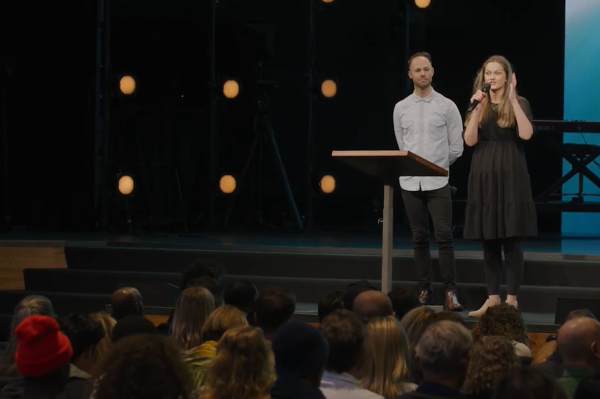In What World Do We Live?

Have you flipped through cable news channels recently? Even when talking about the same event, the news anchors spin their reports into remarkably different stories! Read three or four newspapers or news magazines and it will truly feel like the writers are in alternate worlds.
One of the most stunning realities of America in 2018 is the extreme divisiveness of our political, social and media environments. The present daily fight between Democrat and Republican warriors will not go well. Our hearts cry out for an authentic third perspective that can also affirm all the good principles in both the Democrat world and the Republican world.
Have you noticed that generally even when Christian people promote standards for civic responsibility, their selection of principles is determined by their political preferences as Democrats, Republicans or Independents? Far too often it seems that fellow Christian people's loyalties to a political party or a political movement are stronger than their commitment to our LORD and to the Holy Bible. Now in our highly politicized environment, merely having Democratic or Republican principles only divides – including dividing the Church, friendships, and even families. Literally providentially, the best principles are not defined by political parties and their platforms, but by the Bible.
In 2004, I helped the National Association of Evangelicals to write and endorse Seven Principles of Civic Engagement as part of its "For the Health of the Nation." Those are principles 1-7 that I briefly summarize below. I was also a contributing author of a helpful book related to that wonderful NAE event: Toward an Evangelical Public Policy, published by Baker Book House in 2005.
Back in 2004, I also argued for an eighth principle: "Pursue Racial Reconciliation." Personally, I have actually put my life on the line for racial reconciliation. Additionally, I have labored for multiethnic respect from my earliest teenage years. For decades I have often been stunned by many other people's blindness to utterly obvious racial and ethnic bias. Racial Reconciliation is an enormous theme in the Bible, and failures to "Pursue Racial Reconciliation" have contributed to huge crises, harmful divisions, and enduring disempowerments of American Churches in the 1840s and ever since then. Thankfully, recent events have reawakened our leaders at the NAE to urgent racial issues. Consequently, the NAE has just this year voted – 14 years after my initial urging – to include my eighth principle! Hallelujah!
However, since 2004 I have become convinced of two additional principles as essential for Biblical civic responsibility:
- Make Restorative Justice the Prime Purpose of Criminal Justice Programs
- Universally Empower with Language-Arts in Homes, Churches, and Schools.
These three additional essential Biblical standards are summarized below as Principles 8-10. All these ten principles are firmly Biblical, so that their numerical order has nothing to do with priority.
Here is an especially revealing recommendation for this list of reminders of Biblical teaching: Among these top ten Biblical principles it is quite telling that half of them have been in recent times well-promoted by the Democratic Party leaders, while the other half are well-promoted by the Republican Party leaders. It is a shocking tragedy that we have these top Biblical principles only in pieces. It is disappointing when some Republican leaders are quick to protect the lives of babies till in the womb, but who have much less commitment to a safe and healthy environment once the baby is born. It is just as disappointing when some Democrat leaders articulate intensely important environmental concerns but have not one word against elective abortions that are senselessly killing millions of human babies. Is it not far better that we enthusiastically embrace both the sanctity of human life (Principle #2) and equally important care for all of God's creation (Principle #7)?
What would the world be like if we guided our civic engagement by these uniting Biblical principles? What would America be like if we were awakened by Godly consciousness to uphold divine standards with enthusiasm? By God's amazing grace, may Christian brothers and sisters – who are also Republicans, Democrats, and Independents – hold our politicians accountable on all these ten precious Biblical principles.
1. Nurture family life and protect children.
Marriage is the primary Biblical model for human relationships. Whether we are married or single, it is in the family that (a) we learn mutual submission and responsibility, (b) we learn to live in an ordered society with complementary roles, (c) we learn to love and to trust, (d) we learn both justice and mercy, and (e) we learn to deny ourselves for the well-being of others.
2. Protect the sanctity of human life.
Because God created human beings as divine images of God, all people share in divine sanctity. Infanticide, abortion-on-demand, euthanasia, and irresponsible human experimentation and other unnecessary death and damage violate the God-given sanctity of all human life.
3. Defend religious freedom and liberty of conscience for all.
In religious liberty, we reach out to all others (a) in personal respect, (b) to seek mutual understanding and (c) to collaborate on points of common purpose, including especially as common purposes may support these Ten Biblical Principles of Civic Responsibility.
4. Seek justice and compassion, especially for the poor and vulnerable.
God identifies with the poor and tells us that those who "are kind to the poor lend to the Lord," while "those who oppress the poor show contempt for their Maker." The Lord evaluates our behavior especially by how the people at "the bottom" are treated—the people who are considered "the least."
5. Safeguard human rights.
Because God created human beings in the divine image and likeness, all people are endowed with inalienable rights and responsibilities – especially life and liberty and their protection. Governments should be constitutionally obligated to protect these basic human rights.
6. Non-violently resolve conflicts and build peace-creating solutions.
People and governments should thoroughly pursue nonviolent paths to peace before resorting to violence of any sort. Reduce conflict (a) by promoting real community, (b) by engaging in non-violent conflict resolution, and (c) by actively creating cultures of peace in churches, communities, and countries.
7. Care for all of God's creation.
All that God created is good, so that even pollutants are resources out of place. All individuals should engage in creation-friendly behavior by (a) practicing effective recycling, (b) conserving resources, (c) reducing pollution, and (d) experiencing the joy of positive encounters in God's splendid creation.
8. Pursue lasting reconciliation, including especially in racial relationships.
The Bible teaches reconciliation of all people to God and of all people to one another, regardless of race. The Lord is the exemplary reconciler. We serve God and one another in active reconciliation. The Bible teaches people always to reconcile—whether they are the aggressor or the aggrieved.
9. Make restorative justice the prime purpose of criminal justice programs.
While just punishment for crime has a place, the primary Biblical concept of justice is restoration—both the victim and the wrongdoer. Restorative justice is "righteous" in the best and original sense of the term, because it helps make people and systems right, properly honoring the image of God in every person.
10. Universally Empower with Language-Arts in Homes, Churches, and Schools. Training in language arts – reading, writing, listening, and speaking – counts for human flourishing, especially through personal Bible engagement. People not empowered in language arts have less access both to the Scriptures and to success in life—and are more likely victims of the prison-industrial complex. Instead, children and adults empowered in holistic language arts have more opportunities for Godly leadership, wisdom, success, and joy. They can daily open the Bible – and other books and literature – for wisdom, knowledge, empowerment, and encouragement.
In what world do we live? It is possible to walk away from a Republican ideological world, from a Democratic ideological world, and from some of the media's ideological worlds – and into the world of the LORD's restorative Word.
Please see greater details of these Ten Principles in at www.BiblicalAction.com.





















